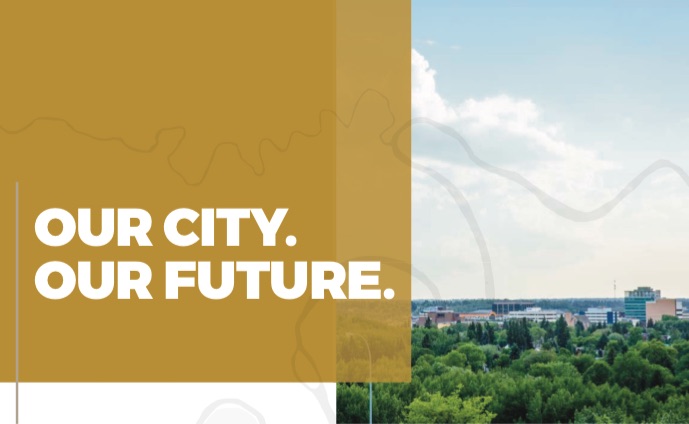City of Red Deer
City Council setting the tone for the long run

City Council to consider 2023 – 2026 Strategic Plan
“We are proud of our innovative and collaborative approach to developing the 2023-2026 Strategic Plan. This plan is truly the result of good process and listening to citizens who contributed through the Shape your Red Deer public participation that took place this spring,” said Mayor Ken Johnston. “Our plan is a blueprint for the important work The City of Red Deer undertakes for the benefit of the entire community; this visioning allows us to make decisions that are not only right for our citizens today, but for years to come so we can become the community we all aspire to be.”
The key principles that will guide The City’s work include respect, new ways of doing, future-focused, citizen-centric service and financial sustainability. The plan also includes three focus areas with outcomes to be achieved by 2026:
- Thriving City: A thriving local economy, driven by a healthy business community and vibrant downtown is paramount, while continuing to protect and enhance the environment.
- Community Health and Wellbeing: Red Deerians cherish the spaces, places and year-round experiences Red Deer offers to promote physical, mental, and social wellbeing. The community is proud of the welcoming and inclusive city Red Deerians call home.
- Connected and Engaged City: Council engages with citizens in ways that build strong, respectful, and collaborative relationships. Citizens feel valued and included in decisions about their city.
“The strategic planning process doesn’t end once developed and adopted by Council. Each department and division will be aligning their service delivery to the Strategic Plan,” said Tara Lodewyk, City Manager. “We will regularly report on our progress towards achieving each outcome in public and visible ways.”
The Strategic Plan is a key planning document for The City of Red Deer as it is City Council’s direction to administration. The development process begins every four years, following the municipal election and sets the direction for the organization for the duration of a Council’s term. Once approved, the Strategic Plan provides the foundation for many of The City’s decisions, including financial resource allocation through the upcoming budget process.
To read more about the Strategic Plan, including previous plans, and how public engagement shaped the plan visit www.reddeer.ca/strategicplan.
City of Red Deer
City of Red Deer Employee Honoured with Bob Stollings Memorial Award for Outstanding Contributions

Annette Scheper, Community & Program Facilitator in the Safe & Healthy Communities Department is The City’s 2025 recipient of the Bob Stollings Memorial Award.
The Bob Stollings Memorial Award is given out each year to a City employee who displays outstanding performance in alignment with The City’s RISE cornerstone values – respect, integrity, service and excellence. Nominations for the award are submitted by fellow coworkers detailing the employee’s achievements professionally and interpersonally, along with letters of support. The award is considered a great honour among City staff.
With an impressive 22-year career, Annette has played a pivotal role in shaping Red Deer’s cultural and special events landscape. Her leadership and innovation have brought thousands of successful events to life, creating lasting traditions that enrich the lives of residents. Her commitment to excellence and resourcefulness has ensured that community initiatives are inclusive, accessible, and impactful.
One of Annette’s most notable achievements is the development of the Community Loan Program, which provides essential resources for local groups, contributing an annual value of $86,778.95 back into the community. In addition, she has successfully led and executed a variety of large-scale events, demonstrating remarkable problem-solving skills and a dedication to sustainability. From creating elaborate event designs with repurposed materials to managing complex logistics, she continuously sets the standard for excellence.
“Annette exemplifies the best of our organization,” said City Manager, Tara Lodewyk. “Her unwavering dedication, innovative thinking, and ability to bring people together has made a profound impact on our city. This award is a testament to her hard work and passion for creating meaningful experiences for our community.”
The Bob Stollings Memorial Award was first established in 1985 and is presented every year to honour Robert (Bob) E. Stollings, a loyal and dedicated City employee from 1960-1984.
City of Red Deer
Red Deer will choose a new Mayor as Ken Johnston decides to step away

It’s a telling detail about the person who leads Red Deer City Council. Always putting the city’s needs ahead of his own, Mayor Ken Johnston has announced his intentions within days of the opening of Nominations for October’s municipal elections,
After 12 years on council, Mayor Ken Johnston has decided against running for a second term as Mayor this fall. Johnson shared his decision in front of colleagues and supporters in a touching announcement on Wednesday.
At 71 years old, Johnston remains vibrant, passionate and healthy. He says that’s exactly why he and his wife Carolyn have decided now is the right time to start their next stage of life together.
Mayor Johnston listed a number of highlights and achievements he can look back on, including his help advocating for the redevelopment of Red Deer Regional Hospital, the growth of Red Deer Polytechnic, and positive moves in Economic Development.
All these lead of a feeling of ease about the decision to step away, though affordable housing and a permanent shelter for the homeless remain pressing concerns.
With about 8 months remaining in his term, Mayor Johnston is planning to push hard to move the needle on these housing issues.
“We’re looking forward to some more work and we’ll be going to the community shortly about it. So I still have optimism that maybe before the term is out we can have an announcement.”
This is the second major political announcement in Central Alberta in the last number of days. Earlier this week Red Deer Mountain View MP Earl Dreeshen announced he won’t be running in the next federal election.
-

 2025 Federal Election21 hours ago
2025 Federal Election21 hours agoThe Federal Brief That Should Sink Carney
-

 2025 Federal Election23 hours ago
2025 Federal Election23 hours agoHow Canada’s Mainstream Media Lost the Public Trust
-

 2025 Federal Election1 day ago
2025 Federal Election1 day agoOttawa Confirms China interfering with 2025 federal election: Beijing Seeks to Block Joe Tay’s Election
-

 2025 Federal Election1 day ago
2025 Federal Election1 day agoReal Homes vs. Modular Shoeboxes: The Housing Battle Between Poilievre and Carney
-

 John Stossel22 hours ago
John Stossel22 hours agoClimate Change Myths Part 2: Wildfires, Drought, Rising Sea Level, and Coral Reefs
-

 COVID-1924 hours ago
COVID-1924 hours agoNearly Half of “COVID-19 Deaths” Were Not Due to COVID-19 – Scientific Reports Journal
-

 2025 Federal Election2 days ago
2025 Federal Election2 days agoPoilievre Campaigning To Build A Canadian Economic Fortress
-

 2025 Federal Election2 days ago
2025 Federal Election2 days agoThe Cost of Underselling Canadian Oil and Gas to the USA
